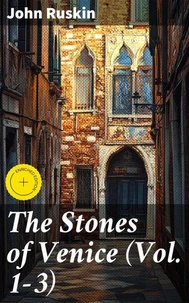The Poetry of Architecture. Or, the Architecture of the Nations of Europe Considered in its Association with Natural Scenery and National Character
Par :Formats :
Disponible dans votre compte client Decitre ou Furet du Nord dès validation de votre commande. Le format ePub est :
- Compatible avec une lecture sur My Vivlio (smartphone, tablette, ordinateur)
- Compatible avec une lecture sur liseuses Vivlio
- Pour les liseuses autres que Vivlio, vous devez utiliser le logiciel Adobe Digital Edition. Non compatible avec la lecture sur les liseuses Kindle, Remarkable et Sony
 , qui est-ce ?
, qui est-ce ?Notre partenaire de plateforme de lecture numérique où vous retrouverez l'ensemble de vos ebooks gratuitement
Pour en savoir plus sur nos ebooks, consultez notre aide en ligne ici
- Nombre de pages161
- FormatePub
- ISBN859-65--4733798-0
- EAN8596547337980
- Date de parution16/09/2022
- Protection num.Digital Watermarking
- Taille1 Mo
- Infos supplémentairesepub
- ÉditeurDIGICAT
Résumé
In "The Poetry of Architecture, " John Ruskin offers a profound exploration of the aesthetic and moral dimensions of architecture. Comprising a collection of essays and critiques, Ruskin employs a lyrical prose style that intertwines his admiration for the Gothic architectural tradition with philosophical reflections on beauty and truth. His keen observations reveal how architecture serves as a reflection of a society's values, capturing the interplay between form and function in a rapidly industrializing world.
The book stands as a crucial commentary during the Victorian era, affirming the emotive power of structures amidst the mechanical progress of the 19th century. John Ruskin, a leading art critic and social thinker, was notably influenced by his early exposure to nature and art. His simultaneous roles as an architect, painter, and passionate advocate for the preservation of the past infused his work with a unique perspective.
These experiences cultivated his belief in the intrinsic connection between natural beauty and artistic creation, prompting a desire to articulate architecture's deeper significance in society. Recommended for scholars and enthusiasts of architecture, art history, and Victorian culture, "The Poetry of Architecture" invites readers to rediscover the emotional resonance of built environments. Ruskin's eloquent prose and profound insights will undoubtedly encourage a more thoughtful appreciation of architecture's role in shaping human experience.
The book stands as a crucial commentary during the Victorian era, affirming the emotive power of structures amidst the mechanical progress of the 19th century. John Ruskin, a leading art critic and social thinker, was notably influenced by his early exposure to nature and art. His simultaneous roles as an architect, painter, and passionate advocate for the preservation of the past infused his work with a unique perspective.
These experiences cultivated his belief in the intrinsic connection between natural beauty and artistic creation, prompting a desire to articulate architecture's deeper significance in society. Recommended for scholars and enthusiasts of architecture, art history, and Victorian culture, "The Poetry of Architecture" invites readers to rediscover the emotional resonance of built environments. Ruskin's eloquent prose and profound insights will undoubtedly encourage a more thoughtful appreciation of architecture's role in shaping human experience.
In "The Poetry of Architecture, " John Ruskin offers a profound exploration of the aesthetic and moral dimensions of architecture. Comprising a collection of essays and critiques, Ruskin employs a lyrical prose style that intertwines his admiration for the Gothic architectural tradition with philosophical reflections on beauty and truth. His keen observations reveal how architecture serves as a reflection of a society's values, capturing the interplay between form and function in a rapidly industrializing world.
The book stands as a crucial commentary during the Victorian era, affirming the emotive power of structures amidst the mechanical progress of the 19th century. John Ruskin, a leading art critic and social thinker, was notably influenced by his early exposure to nature and art. His simultaneous roles as an architect, painter, and passionate advocate for the preservation of the past infused his work with a unique perspective.
These experiences cultivated his belief in the intrinsic connection between natural beauty and artistic creation, prompting a desire to articulate architecture's deeper significance in society. Recommended for scholars and enthusiasts of architecture, art history, and Victorian culture, "The Poetry of Architecture" invites readers to rediscover the emotional resonance of built environments. Ruskin's eloquent prose and profound insights will undoubtedly encourage a more thoughtful appreciation of architecture's role in shaping human experience.
The book stands as a crucial commentary during the Victorian era, affirming the emotive power of structures amidst the mechanical progress of the 19th century. John Ruskin, a leading art critic and social thinker, was notably influenced by his early exposure to nature and art. His simultaneous roles as an architect, painter, and passionate advocate for the preservation of the past infused his work with a unique perspective.
These experiences cultivated his belief in the intrinsic connection between natural beauty and artistic creation, prompting a desire to articulate architecture's deeper significance in society. Recommended for scholars and enthusiasts of architecture, art history, and Victorian culture, "The Poetry of Architecture" invites readers to rediscover the emotional resonance of built environments. Ruskin's eloquent prose and profound insights will undoubtedly encourage a more thoughtful appreciation of architecture's role in shaping human experience.



